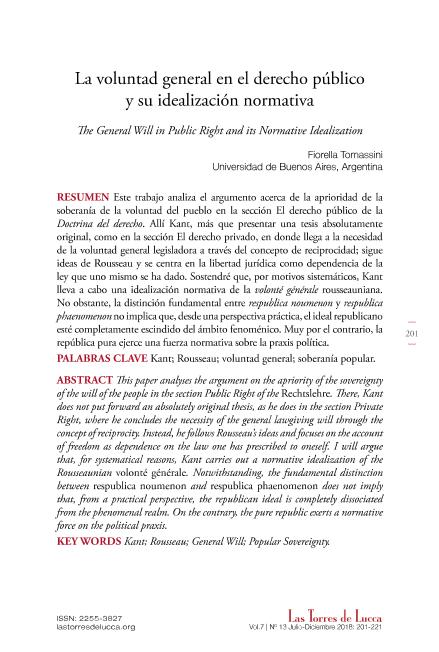Mostrar el registro sencillo del ítem
dc.contributor.author
Tomassini Abaurrea, Fiorella

dc.date.available
2020-05-08T13:26:11Z
dc.date.issued
2018-12
dc.identifier.citation
Tomassini Abaurrea, Fiorella; La voluntad general en el Derecho Público y su idealización normativa; Universidad Complutense de Madrid; Las Torres de Lucca; 13; 12-2018
dc.identifier.issn
2255-3827
dc.identifier.uri
http://hdl.handle.net/11336/104597
dc.description.abstract
Este trabajo analiza el argumento acerca de la aprioridad de la soberanía de la voluntad del pueblo en la sección El derecho público de la Rechtslehre. Allí Kant, más que presentar una tesis absolutamente original, como en la sección El derecho privado, en donde llega a la necesidad de la voluntad general legisladora a través del concepto de reciprocidad, sigue ideas de Rousseau y se centra en la libertad jurídica como dependencia de la ley que uno mismo se ha dado. Sostendré que, por motivos sistemáticos, Kant lleva a cabo una idealización normativa de la volonté générale rousseauniana. No obstante, la distinción fundamental entre respublica noumenon y respublica phaenomenon no implica que, desde una perspectiva práctica, el ideal republicano esté completamente escindido del ámbito fenoménico. Muy por el contrario, la república pura ejerce una fuerza normativa sobre la praxis política.
dc.description.abstract
This paper analyses the argument on the apriority of the sovereignty of the will of the people in the section Public Right of the Rechtslehre. There, Kant does not put forward an absolutely original thesis, as he does in the section Private Right, where he concludes the necessity of the general lawgiving will through the concept of reciprocity. Instead, he follows Rousseau’s ideas and focuses on the account of freedom as dependence on the law one has prescribed to oneself. I will argue that, for systematical reasons, Kant carries out a normative idealization of the Rousseaunian volonté générale. Notwithstanding, the fundamental distinction between respublica noumenon and respublica phaenomenon does not imply that, from a practical perspective, the republican ideal is completely dissociated from the phenomenal realm. On the contrary, the pure republic exerts a normative force on the political praxis.
dc.format
application/pdf
dc.language.iso
spa
dc.publisher
Universidad Complutense de Madrid

dc.rights
info:eu-repo/semantics/openAccess
dc.rights.uri
https://creativecommons.org/licenses/by-nc-sa/2.5/ar/
dc.subject
KANT
dc.subject
VOLUNTAD GENERAL
dc.subject
DERECHO PÚBLICO
dc.subject
IDEALIZACIÓN NORMATIVA
dc.subject.classification
Otras Filosofía, Étnica y Religión

dc.subject.classification
Filosofía, Ética y Religión

dc.subject.classification
HUMANIDADES

dc.title
La voluntad general en el Derecho Público y su idealización normativa
dc.title
The General Will in Public Right and its Normative Idealization
dc.type
info:eu-repo/semantics/article
dc.type
info:ar-repo/semantics/artículo
dc.type
info:eu-repo/semantics/publishedVersion
dc.date.updated
2020-05-05T18:42:20Z
dc.journal.volume
13
dc.journal.pais
España

dc.journal.ciudad
Madrid
dc.description.fil
Fil: Tomassini Abaurrea, Fiorella. Consejo Nacional de Investigaciones Científicas y Técnicas; Argentina. Universidad de Buenos Aires; Argentina
dc.journal.title
Las Torres de Lucca
dc.relation.alternativeid
info:eu-repo/semantics/altIdentifier/url/http://www.lastorresdelucca.org/index.php/ojs/article/view/192
Archivos asociados
